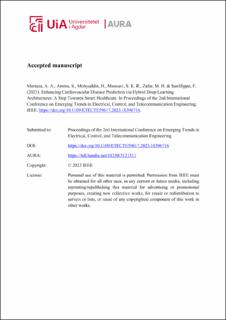| dc.contributor.author | Murtaza, Aitzaz Ahmed | |
| dc.contributor.author | Amina, Saher | |
| dc.contributor.author | Mohyuddin, Hassan | |
| dc.contributor.author | Moosavi, Syed Kumayl Raza | |
| dc.contributor.author | Zafar, Muhammad Hamza | |
| dc.contributor.author | Sanfilippo, Filippo | |
| dc.date.accessioned | 2024-03-06T13:47:55Z | |
| dc.date.available | 2024-03-06T13:47:55Z | |
| dc.date.created | 2024-01-25T20:04:16Z | |
| dc.date.issued | 2023 | |
| dc.identifier.citation | Murtaza, A. A., Amina, S., Mohyuddin, H., Moosavi, S. K. R., Zafar, M. H. & Sanfilippo, F. (2023). Enhancing Cardiovascular Disease Prediction via Hybrid Deep Learning Architectures : A Step Towards Smart Healthcare. In Proceedings of the 2nd International Conference on Emerging Trends in Electrical, Control, and Telecommunication Engineering. IEEE. | en_US |
| dc.identifier.isbn | 979-8-3503-0565-4 | |
| dc.identifier.uri | https://hdl.handle.net/11250/3121311 | |
| dc.description | Author's accepted manuscript. | en_US |
| dc.description.abstract | Cardiovascular disease presents a serious and increasing global health challenge, making a substantial contribution to morbidity and mortality rates on a global scale. This research study presents a novel methodology for predicting Cardiovascular Diseases by employing a, recently developed, metaheuristic optimisation algorithm within a neural network framework. The Coati Optimisation Algorithm (COA) is employed in an artificial neural network (ANN) to enhance the predictive accuracy of outcomes related to Cardiovascular Diseases. The enhanced performance of the COA can be ascribed to its adept utilisation of both exploration and exploitation phenomena. This research employs publicly available datasets pertaining to heart and stroke disorders, integrating two datasets focused on heart disease and one dataset focused on stroke disease. A comparison analysis is undertaken between the proposed COA-ANN and existing approaches, namely Particle Swarm Optimizer based ANN (PSO-ANN), Grey Wolf Optimizer based ANN (GWO-ANN), and backpropagation based ANN (BP-ANN). The findings of the study indicate that the COA-ANN model exhibits the highest level of predictive accuracy. The COAANN outperformed the other three networks, namely GWOANN, PSO-ANN, and BP-ANN, with an average accuracy of 98.43%. As a result, the utilisation of the COA-ANN leads to an improvement in predictive accuracy for these datasets, with an increase of up to 2.64%. Additional assessment metrics, such as F1-Score, Precision, and Recall, provide more insight into the balanced performance of the COA-ANN architecture when applied to imbalanced class datasets. These results prove that the integration of nature-inspired algorithms with cardiovascular diseases (CVDs) is a promising direction for future research. | en_US |
| dc.language.iso | eng | en_US |
| dc.publisher | IEEE | en_US |
| dc.title | Enhancing Cardiovascular Disease Prediction via Hybrid Deep Learning Architectures : A Step Towards Smart Healthcare | en_US |
| dc.type | Chapter | en_US |
| dc.type | Peer reviewed | en_US |
| dc.description.version | acceptedVersion | en_US |
| dc.rights.holder | © 2023 IEEE | en_US |
| dc.subject.nsi | VDP::Teknologi: 500 | en_US |
| dc.source.pagenumber | 6 | en_US |
| dc.identifier.doi | https://doi.org/10.1109/ETECTE59617.2023.10396716 | |
| dc.identifier.cristin | 2234777 | |
| cristin.qualitycode | 1 | |
